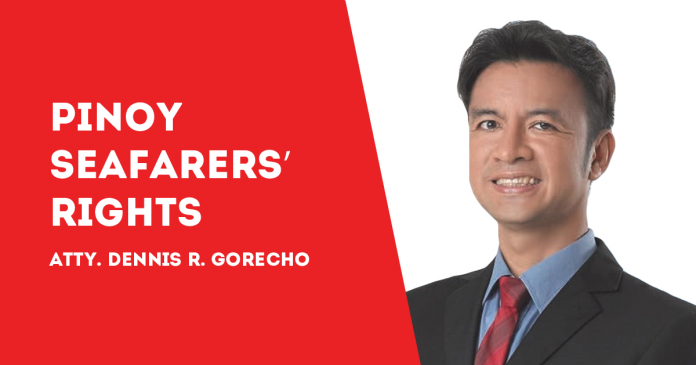
“HANA NI ta magawid ayu nga mapmaphod tapnu muntitiggawan tuu.”
It is the Ifugao translation of “We hope you come home safe so we could see each other again” – a message that my friend Maya Addug-Sanchez wants her brother, Captain Dante Addug, to receive and respond to.
I personally know the Addug siblings since I am a frequent visitor of Batad, Banaue in Ifugao where their family manages a travellers’ inn.
Dante is the captain of the Panama-flagged livestock carrier Gulf Livestock 1 that capsized in southwest Japan on Sept. 2, 2020 during the onslaught of Typhoon Maysak, equivalent to a Category 4 hurricane with winds of at least 130 mph.
The 2002-built 133.6-meter-long (438 foot) ship had on board 39 Filipinos, two New Zealanders and two Australians as crew as well as 5,800 cattle.
The vessel left Napier, New Zealand on Aug. 14, 2020 and was sailing to Tangshan, China when it experienced an engine issue and sent a distress signal before it went missing.
After eight days of Search and Rescue (SAR) operations, the Japanese coast guard lowered own its massive operations to normal patrol schedules on Sept. 10 after it found no trace of the ship since Sept. 5. Both aerial searches and four coastguard vessels could not locate the vessel, and all communication has been lost. It is believed that the vessel has sunk.
Two crew have been found alive so far, and another was found unconscious and pronounced dead on arrival at a Japanese hospital.
One of the survivors narrated that the ship’s main engine failed before the vessel was struck by a big wave and capsized. He said the crew had put on their life jackets and they all jumped into the water.
Captain Addug has been scheduled to be repatriated this month as his contract was due to expire, and he was excited to meet his four-month-old son for the first time once he is reunited with his family.
He is the youngest of a family of eight, two of them became seafarers, and he has five children. He is also the youngest to become a ship captain from Ifugao.
It was 8:30 p.m. of Sept. 1 that Dante spoke for the last time to his partner, Marielle June Chunanon, saying that Typhoon Maysak was battering the ship, water was already flowing in, and that he would go to the bridge to check the situation.
The families of the missing seafarers want the search and rescue operations to still continue.
They are calling upon the Japanese government to invite Australia and New Zealand to share search and rescue resources.
Situations like the sinking of Gulf Livestock 1 normally calls for the application of the “Good Samaritan vessel” doctrine.
For centuries, this maritime rescue doctrine encourages seafarers to go to the aid of life and property in distress.
Good Samaritan vessels are usually the first to arrive on scene, and are often critical in saving lives.
In most cases, a person reacts to save another person as result of compassion or instinct, or both.
Seafarers, on the other hand, also have a legislated obligation to render assistance.
This obligation comes from various legal sources, most notably international conventions from the United Nations (UN) and the International Maritime Organization (IMO).
The United Nations Convention on Law of the Sea (UNCLOS) says that every signatory to the convention must require the master of a ship flying its flag to render assistance to any person found at sea in danger of being lost and to proceed to the rescue of persons in distress.
The exemption is when the assisting vessel, the crew or the passengers on board would be seriously endangered as a result of rendering assistance to those in distress.
The Safety of Life at Sea Convention (SOLAS) says “the master of a ship at sea which is in a position to be able to provide assistance, on receiving a signal from any source that persons are in distress at sea, is bound to proceed with all speed to their assistance, if possible informing them or the search and rescue service that the ship is doing so.”
The International Convention on Maritime Search and Rescue 1979 (SAR) also mandates this principle “regardless of the nationality or status of such a person or the circumstances in which that person is found.”
It also adds an obligation for all vessels’ masters to offer assistance to those in distress and controls the use of lifesaving signals with specific requirements regarding danger and distress messages
The Salvage Convention of 1989, although primarily directed at addressing the salvage of property and the prevention of marine pollution, nonetheless repeats the SOLAS obligation on the master to render assistance to any person in danger of being lost at sea.
The duty to render assistance is a general reflection of customary international maritime law.
“Aji yu ahan isarding an anapon jija. Sibibyag ja pay,” says Maya in Ifugao, which means “Please don’t stop searching. They are still alive.”
The hashtag #SavetheForty is keeping the hopes of the relatives that they will soon receive news that the 40 men are still alive at sea and will be reunited with them.
***
Atty. Dennis Gorecho heads the seafarers’ division of the Sapalo Velez Bundang Bulilan law offices. For comments, email info@sapalovelez.com, or call 09175025808 or 09088665786.)/PN


